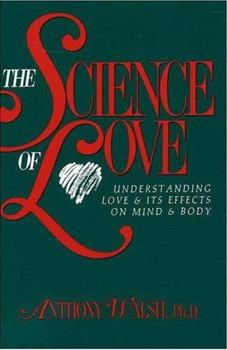The Science of Love
Select Format
Select Condition 
Book Overview
The topic of "love" has been addressed in books that range from collections of syrupy aphorisms to "how-to" books on relationships. But love is far too broad and interesting a topic to be limited in this way. Although this book includes three chapters on romantic love, it broadens the scope to include the role of love in the developmental process of infants and children, on physical and mental health and illness, on violent criminality, and other...
Format:Paperback
Language:English
ISBN:1573920916
ISBN13:9781573920919
Release Date:September 1996
Publisher:Prometheus Books
Length:276 Pages
Weight:0.90 lbs.
Dimensions:0.7" x 6.1" x 9.1"
Customer Reviews
1 rating
A Scientific Look at Love
Published by Thriftbooks.com User , 19 years ago
Walsh is a sociologist who investigates the current scientific research and what it entails for how we understand various forms of love. The author intends to understand love in all its particulars, including its scientific basis. He defines love as that which "satisfies one's need to receive and bestow affection and nurturance; to give and be given assurances of value, respect, acceptance and appreciation; and to feel secure in a unity with, and belonging to, a particular family, as well as the human family" (9). Walsh laments that even social scientists who explore behavior have infrequently studied love. He is convinced, however, that humans must probe the nature of love and learn how to generate it and sustain it. The book is divided into three sections. The first, entitled "Skin Love," deals with the importance of love in early infancy. Included in this section are chapters exploring the importance of touch and tenderness upon infants in their first experience of love. Walsh also addresses how messages of love affect the structure and function of the infant's developing brain. A chapter is devoted to the differences between male and female parental love upon children. The impact of loving care upon the triune nature of the brain is also examined. It is Walsh's contention that "love is not merely theologically or philosophically desirable, but it is also a biological and psychological necessity" (37). In the second section, Walsh examines what he calls, "kin love," by which he means the loving ties with one's fellow human beings. In examining kin love, the author investigates the psychological and physical problems associated with the absence or deprivation of love. He notes that children suffering from psycho-social dwarfism are severely retarded in physical growth. Walsh notes the negative effects upon the immune system and the susceptibility to disease that those experience who have not been loved adequately. He also points out that love deprivation may interact with social and biological correlates of schizophrenia. Research details the importance that love plays in prevention of suicide; love also is a deterrent for drug and alcohol abuse. In a chapter devoted to criminology, Walsh shows the disturbing statistics by detailing the correlation between lawlessness and the lack of giving and being given love. In the section's final chapter, he argues that some social forms are conducive to love and some are inimical. The book's third segment, which Walsh titles "In Love," deals with romance and how romantic love is generated and sustained. The origin of sex is addressed, as well as the way chemicals in the brain and body effect one's romantic inclinations. Walsh looks at the different ways in which humans -- both males and females -- choose partners and what each finds attractive in the other. Included in this section are Walsh's thoughts about scientific evidence for monogamy, promiscuity, and orgasm. Throughout





